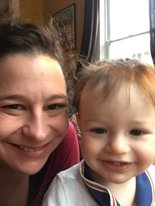 photo credit Michelle Smith Lewis photo credit Michelle Smith Lewis Alia Swersky holds my arms over my head by the wrists, whispers something softly into my ear and then lets go. It is the middle of Swersky’s new solo performance piece, "When your arms ached, I watched the Mountain hold its fragile form," and I, who usually balk at audience participation, am in the middle of the stage. When Alia approached me during a rehearsal viewing and whispered, “I’d like you to join me in the space, you can say no, it’s ok,” I followed her without a second thought. Alia led me around the performance space and prompted my body’s movements, holding my arms up and letting them fall, gently guiding my steps while I kept my eyes closed and walked by her side. When she picked up my arms I kept my muscles mostly limp, trusting her to let them fall only when they were safe from hitting anything that might hurt me. I felt completely comfortable, more powerful and at home in my own body than I remember since giving birth to my son. Alia Swersky’s artistic and physical power is contagious. The culmination of two years of creative and physical preparation, "When your arms ached, I watched the Mountain hold its fragile form"is a combination of durational performance, dance, art installation and dance improvisation that communicates the parallel traumas experienced by female-identifying bodies and mountains. The show requires an incredible amount of energy to perform. In the first two hours Alia rolls around on the floor of the performance space at Base Experimental Arts in Georgetown in a “silent durational ritual,” designed to demonstrate the passage of time and to engage the audience in silent reflection. “For me,” says Swersky in a phone conversation, “the passages of tribes and women and migration through the mountains is right there with the image of the female body rolling around.” Alia incorporates a huge swath of pink fabric into her movements, her hair and the fabric blowing slightly around from wind produced by small fans on the corners of the room. “It’s sensual and sexy with the pink fabric, a soundscape, an environment that I hope people will come into to feel as opposed to being expecting to be entertained. My hope is that people will feel comfortable coming in and laying down, writing, thinking--the ritual deepens the experience of the performance because it contextualizes it.” Accompanied by music and soundscape by Monika Khot, an enormous mural of a mountain by artist Mya Kerner, and lighting by Amiya Brown, Alia Swersky’s performance is an experience, something to think about rather than to just observe and go home--but there’s also a lot of room to enjoy art and the presence of other people. The performance section of “When your arms ached” is packed with symbolism, intense emotion, and beautiful dancing. Swersky’s background in classical dance, improvisation, yoga, meditation, motherhood, and life come together with choreography that is packed with technically brilliant and unique movements. At one point, Swersky faces the audience and points one long, perfectly arched foot at the ground while vibrating her upper body almost violently. The juxtaposition of visually stunning physicality combined with disturbing violent messages are synonymous with “the onslaught of violence of our culture and our environment and on woman and woman’s body,” says Swersky. “I’m not trying to be an environmental activist in this piece, but the metaphor of the fracking of mountains and rape are there.” Despite these heavy themes, "When your arms ached, I watched the Mountain hold its fragile form" isn’t a piece about sadness or panic in the face of cultural and environmental degradation. “While there were some things going on in my life while I made this piece, some of the actual physical movements like the shaking and holding my arms up demonstrate a rite of passage back into my purpose after abandoning my art in some ways.” Swersky wants her audience to experience this rite of passage as a way to connect to the idea that “we aren’t alone, that connections to one another are essential,” she says. This is why the section where she holds an audience member’s arms for them is so important. “I’m from Colorado and I’ve always had this sense that I had to be as strong as the mountain,” says Swersky. “We think that it’s strong and stable but the mountains are always changing and eroding, just like us. None of us can get through this alone. You can be belittled by it or you can take charge of it. Be as big as the mountain and look into the male gaze and be in charge.” "When your arms ached, I watched the Mountain hold its fragile form" runs May 17-19 at varied times. Schedule and tickets here, more about Alia here
1 Comment
 I ran into an old friend today while out walking with my son, and in an instant went from feeling on top of the world to shoulder-slumping despair. My friend is beautiful, ten years my junior--and not a parent. I am 40 and a stay at home mother to a teething one year old with a cold. I began this morning with a 5:30 AM shift at my twice-monthly volunteer job after waking every 90 minutes all night to breastfeed a cranky baby. I came home to a sleepy family who giggled with me over breakfast. I ran around the house doing chores with my 25 lb son on my back, bundled him into the stroller mid-morning and walked to the store with a big sense of accomplishment sitting on my shoulder whispering "Good girl, rock on girl." As I type this, my crappy mood is fading. When I met my friend, I glimpsed myself in the window behind her perfectly-pinned hair, flawless makeup, painted toenails. The bags under my eyes were visible in the reflection, frizzy post-pregnancy hair flying away in a hundred directions, baggy sweater over jeans mottled with old oatmeal and rogue baby loogies. And after everything I'd done already today, that was how I judged myself. Not as the sleep-deprived mom who still got up before dawn to work at a women's shelter, not as the domestic goddess who made breakfast from scratch for three people in ten minutes flat. Not as the wife who spent five minutes oogling and kissing her husband before sending him off to work, humming and smiling to himself. With each of these actions, I was healing the people I love and preparing them to meet their day with healthy bodies and hearts full of peace. And that, right now, is how I fight. Not by going to every demonstration or teach-in, not by writing every senator and politician, not by posting my thoughts on social media. But by feeding those around me, sometimes instead of brushing my hair. I resist the dangers of our world, at this particularly scary time, by love. |
AuthorMother Archives
September 2022
Categories
All
|
 RSS Feed
RSS Feed
